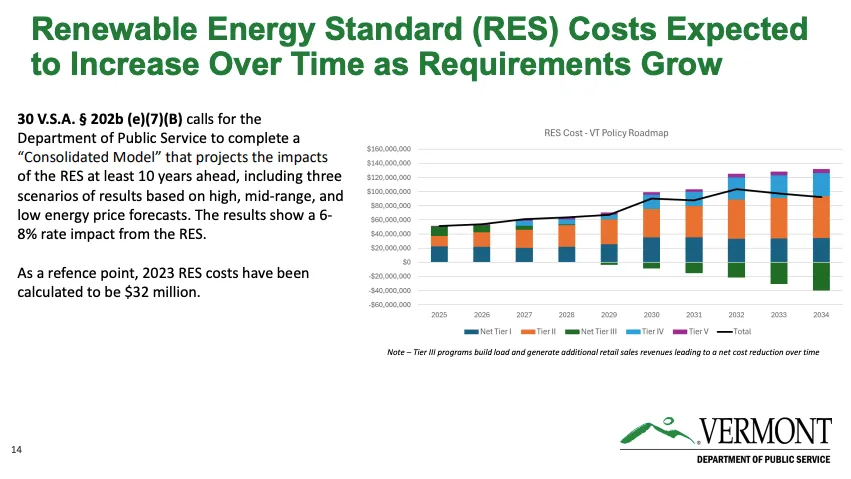Ronald Reagan famously quipped, “The trouble with our Liberal friends is not that they’re ignorant; it’s just that they know so much that isn’t so.” This was on full display in the House Energy & Digital Infrastructure Committee as ranking member Laura Sibilia (I-Dover) made a number of statements about the Renewable Energy Standard (RES) – a policy she played a large role in crafting – that were not just wrong, but the total opposite of what she was asserting.
The big point of contention was over cost of the RES to electric ratepayers. TJ Poor of the Department of Public Service presented data showing that the RES added $32 million to Vermonters’ cost of electricity in 2023, and moving forward it is projected to increase rates by 6-8 percent on top of the normal market price. In total dollars, that amounts to around $50 million extra charges in 2025 rising to $90 million (net) by 2034. But Sibilia insisted that, no, the RES somehow reduced ratepayer costs.
It doesn’t. It can’t. It can’t because when you force utilities to buy more expensive renewable products or buy “credits” on top of the cost of the non-renewable power they purchase it must by definition add to the cost of the end product. And so, it does!
Still, Sibilia pressed Poor, “So, this slide is showing us a projection of RES cost increasing over time. But it’s not showing us the net of, you know, like, what the cost might be if we did not have this regulatory frame, is it?”
But that’s exactly what the chart shows. “These are the above market costs of Vermonters from the renewable energy standard,” explained Poor (again).

Sibilia tried a different method of accounting to maintain her delusion that this program is somehow cost effective, “We know Vermont has some of the stablest and lowest rates in New England [We do, but as I have noted before this is like being the sexiest guy in the leper colony. VT ranks 41st in the country for electric rates.], and I attribute a lot of that to the RES.”
Nope. Correlation is not necessarily causation, and in this case it’s not. In this case the RES works counter to the factors that have led to our having lower electric rates than those nine whole other states.
Poor responded to this misinformational spin, “If you’re making a connection of the Renewable Energy Standard being a cause of our lower and stable our prices, I’m not sure if that is true…. The requirements to purchase that power have caused costs more than what it otherwise would have cost to secure that power.”
Sibilia, “Say that again.” Yes, please do!
Poor, again, “The renewable energy standard has caused costs greater than what it would have otherwise cost to secure that power.” Duh!
Sibilia persists with her unreality, “So I think over time, this [RES] has been beneficial in terms of rates.” Facepalm/head shake/tears welling through fingers….
Poor, with a patients and politeness I would not have been able to muster under the circumstances, “I don’t believe so…. the cost of the renewable energy standard, if we did not have it, we would have slightly lower [electric] rates.”
Sibilia shifts her spin again, this time insisting that the long-term energy contracts Vermont utilities enter into and have had a stabilizing influence on our electric rates are a direct result of her RES policy.
Again, nope.
“The RES isn’t what has caused long term purchases in Vermont,” Poor explained. “Yes, we do long term purchases to meet the Renewable Energy Standard, but we had the Hydro Quebec contract. We had the Kingdom Community Wind. It’s not a contract, but they had Green Mountain Power built it. Right? Sheffield contract, other contracts with wind resources in New England that were made before the renewable energy standard was in effect, and they’re long term contracts going forward.”
In my last article I referenced an observation made by Ruy Teixeira, that leftist politicians “have developed a philosophy … that prizes ideological commitments over mundane realities….” And that’s again what’s happening here. As Poor pointed out in his testimony, though I paraphrase here, adopting the RES represents and ideological commitment to reducing the state’s greenhouse gas emissions, it mandates that Vermonters pay a premium that amounts to multiple tens of millions of dollars a year on our electric bills to do so, and it ignores the mundane reality that Vermonters can’t afford unnecessarily higher electric bills for less reliable energy. Just be honest about it!
But please stop telling us that the liquid pouring off your policies and down our backs is rain and not the far less desirable substance that it is. The dishonesty just adds insult to the financial injury.
